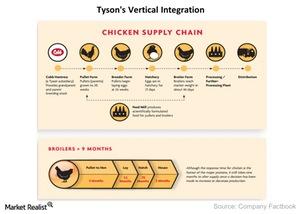Vertical Integration Keeps Tyson Foods On Top Of Chicken Market
Vertical integration involves a single company owning and controlling all the various stages in the production chain.
Dec. 12 2014, Updated 12:00 p.m. ET

Tyson’s vertical integration
The Chicken segment generated Tyson Foods, Inc.’s (TSN) second-largest share of revenues, $11 billion in the fiscal year ended September 2014.
Between the raw commodities and the end product, there may be several processes managed by one or many companies that handle the goods throughout the chain. Depending on its position in this chain, a company is called either an upstream or downstream unit. An upstream unit is positioned at the beginning of the chain, and a downstream unit is positioned at the end of it.
A single company may decide to integrate all the stages in this chain to gain control over the supply of raw materials and strengthen its position in the market. This process is known as vertical integration.
Production process
Tyson’s poultry production process is fully vertically integrated. It begins with poultry breeding stock that are raised on a pullet farm for 20 weeks. After this, the chickens are sent to the breeder house where they lay eggs at around 26 weeks. Once the eggs hatch, the breeder chicks are sent to contract growers, which raise the chicks according to Tyson’s standards. Primary processing of the chickens, which includes culling and more processing stages such as portioning, value adding, and preserving, follows. Finally, the end product is transported and marketed to its end consumers.
Cobb-Vantrass, Inc. supplies the poultry breeding stock as we see in the chart above. Cobb-Vantrass is a fully owned subsidiary of Tyson Foods.
Competition
According to Watt Poultry, Tyson Foods is the top-ranked producer of ready-to-cook chicken products. It’s followed by Pilgrim’s Pride Corp. (PPC), Sanderson Farms, Inc. (SAFM), and Perdue Farms Incorporated, which is privately held. These stocks are considered consumer staples, meaning they are essential and don’t get impacted much during a recession. The Consumer Staples Select Sector SPDR Fund (XLP) holds Tyson Foords (TSN) and Hormel Foods Corp. (HRL).
Next, we’ll look at the Pork segment.
